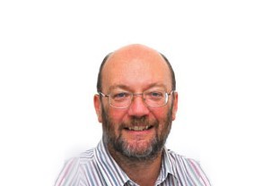event services in Edinburgh
Interview with Professor Bruce Whitelaw

Genus Personal Chair of Animal Biotechnology
LinkedIn: Bruce Whitelaw
Bruce Whitelaw is currently the Deputy Director (Partnerships) of The Roslin Institute of the University of Edinburgh. The Roslin Institute, part of the Royal (Dick) School of Veterinary Studies, is located on the Easter Bush Campus, where Bruce holds the Chair of Animal Biotechnology. After studying for his BSc in Medical Microbiology at Edinburgh, Bruce moved to Glasgow to do his PhD, returning back to Edinburgh in 1986 to take up a position in the then AFRC’s Animal Breeding Research Organisation based at King’s Buildings. Subsequently migrating to a post in the BBSRC’s Institute of Animal Physiology and Genetics Research before becoming Head of Division at the Roslin Institute.
Bruce’s research focuses on genetic engineering of farmed animals. Having honed his molecular genetics skills during his PhD studies at the Beatson Institute in Glasgow, returning to Edinburgh enabled Bruce to move from cell based research to working on animal genetic engineering. His research has included the development of bioreactors of human biomedical proteins and models of human disease, using viral vector s for transgene delivery and producing livestock resistant to virus infection.
Bruce is a Fellow of the Royal Society of Biology. He is also Chairman of the University of Edinburgh’s Roslin Innovation Centre and of TAG-UK, the UK subsidiary of the emerging India animal biotech company Tropical Animal Genetics, both located on the Easter Bush Campus. This campus is houses the University’s Veterinary School, The Roslin Institute, the Centre for Tropical Livestock Genetics and Health, the Global Academy of Agriculture and Food Security and part of Scotland’s Rural College, along with the neighbouring Moredun Research Institute, is one of the largest concentrations of animal researchers in Europe – and is a great place to work. The Campus is the focus for the Agritech contribution to the Data-Driven Innovation (DDI) aspect of the Edinburgh and South-East Scotland City Deal. Bruce is the University of Edinburgh’s DDI Agritech Hub Lead.
How does The Roslin Institute work to improve the well-being, resilience and productivity of livestock and how does this benefit farming and food production?
The Roslin Institute aims to enhance the lives of animals and humans through world class research in animal biology. With a focus on gaining fundamental understanding of genetic, cellular, organ and systems bioscience underpinning common mechanisms of animal development and pathology, Roslin uses this knowledge to prevent and treat important veterinary diseases and develop sustainable farm animal production systems. Roslin prides itself in its ability to work with external organization and commercial partners to use knowledge of normal growth and health of animals to address issues of practical importance in the animal health and breeding sector. Our mission is to maintain a leadership role in animal science through outreach, working with industry, training and teaching.
Our research enhances the health and welfare of animals through knowledge of the genetic and environmental factors affecting lifelong health. We do this by studying the impact of farming practices and life experiences and developing improved approaches to their husbandry, management and through developing sustainable agricultural systems through understanding of their reproduction, development and body systems. In addition, we aim to combat animal disease and mitigate the impact of antimicrobial resistance through research to detect, treat and prevent infections, and control diseases passed from farmed animals to humans, including by understanding routes and risk factors for transmission, breeding resistant animals, and developing vaccines and treatments. Importantly we seek to apply this knowledge to optimise the selection and breeding of farm animals both locally with the UK and in low- and middle-income countries where livestock are of particular importance to livelihoods and health.
What are the biggest challenges currently facing Animal Biotechnology?
Perception. Animal biotechnology offers one potential solution to many of the grand challenges facing the world. There are now many tools in the geneticist’s toolbox which could be used to enhance the lives of animals, while helping to provide environmentally sustainable agriculture and contribute to providing the appropriate food security that society needs. How animal biotechnology is perceived differs amongst communities – this is especially so for genetic engineering. The challenge is now to provide society with tangible examples of how this technology can be used to enable constructive dialogue of how it should be used.
In parallel, to provide the confidence on appropriate use robust, evidence-based regulatory process need to be established – and this need a global approach. Many countries around the world are this topic but as yet no consensus has emerged, with some countries restricting the use of genetic engineering in agriculture will others are already exploiting it.
Obviously when working with animals there are ethical norms and concerns that need to be addressed. As often in this aspect, the UK is providing a leadership role. I am a member of the Nuffield Council’s Working Group on Genome Editing and Farm Animals. The Nuffield Council’s identified that the potential development of genome editing for use in agriculture required urgent ethical scrutiny. The Working Groups’ Report will emerge next year.
In what areas of Animal Biotechnology do you think Edinburgh’s key strengths lie?
The Roslin Institute is recognized as being world leading in animal genetic research. My contribution to this has been the development of genetic engineering technologies in farmed animals. Recently I have focused on the appropriate and beneficial use of genome editing in livestock.
To give an example, even with the development of drugs and vaccines, infectious disease remains one of the largest burdens on farmed animals. Impacting on productivity and the economics of farming, while often having devastating impact on the welfare of the individual animals. Given this position, genome editing offers a new approach to address some aspects of disease mitigation. We are specifically addressing the two leading infectious disease of pigs – African Swine Fever and Porcine Reproductive and Respiratory Disease (PRRS). Both diseases result in the death of millions of animals a year. Using genome editing technology we have produced pigs that are resistant to the virus causing PRRS. Upon challenge with live virus, these edited animals show no pathology, indeed no signs of disease. Genome editing technology has produced the first pigs resistant to PRRS. If implemented in the field this would transform pig production around the world and stop pigs from dying from this virus. I am keen for society to discuss this application.
The Royal (Dick) School of Veterinary Studies is recognized for providing world-class veterinary education, research, and clinical services. This month, the R(D)SVS came top of the Times Good University Guide for Veterinary Medicine for the 5th year in a row.
In your opinion, how important are academic conferences for furthering knowledge?
I believe they are essential. Attending conferences, presenting your latest results, sharing ideas with colleagues while hearing about new ideas reenergises the mind – and you reconnect with old friends while making new friends. The motivation gained from participating in conferences pushes forward the science you are involved in.
Long gone are the days when an individual scientist could produce breakthrough discoveries. Progress now requires a multidisciplinary, collaborative approach. Conferences are the ideal interactive environment to make the needed connections to achieve this. The power of multidisciplinary scientific research is all the more evident as we enter the so called era of big-data.
Have you been involved in bringing academic conferences to Edinburgh in the past?
Yes. Early in my career, the first conference I organized was held at the Royal Society of Edinburgh in 1992. As a young post-doc I had the opportunity to invite key scientists to Edinburgh. A great privilege to meet such inspirational players in my field and proud to showcase my city Edinburgh. Since then I have brought 6 scientific conferences to Edinburgh. Attracting participants both on the scientific topic and the city’s reputation. I have yet to hear a conference participant say they did not enjoy the ceilidh we put on.
The biggest conference I have brought to Edinburgh I organized with two good colleagues – Drs Peter Hohenstein and Douglas Strathdee. Between us we organised the International Society of Transgenic Technologies 2014 conference. Held in the Assembly Rooms, this conference brought 530 people to Edinburgh. Great science was presented with mush discussion – and yes we had brilliant fun teaching our visitors how to do the ‘strip the willow’.
Is there a particular conference you would like to see come to Edinburgh in the future and why?
I would very much like to see the International Embryo Transfer Society annual conference come to Edinburgh. As the established leading conference in this field and reflecting both the historic and current leadership Edinburgh researchers are playing in animal biotechnology I am sure this would be a huge success on all fronts.

